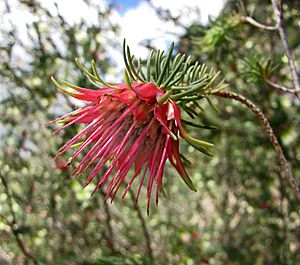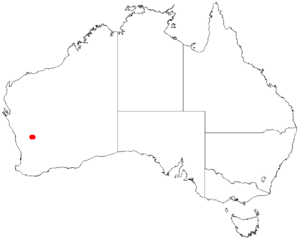Mason's darwinia facts for kids
Quick facts for kids Mason's darwinia |
|
|---|---|
 |
|
| Conservation status | |
| Scientific classification |
|
| Kingdom: | Plantae |
| Clade: | Tracheophytes |
| Clade: | Angiosperms |
| Clade: | Eudicots |
| Clade: | Rosids |
| Order: | Myrtales |
| Family: | Myrtaceae |
| Genus: | Darwinia |
| Species: |
D. masonii
|
| Binomial name | |
| Darwinia masonii C.A.Gardner
|
|
 |
|
| Occurrence data from AVH | |
| Script error: The function "autoWithCaption" does not exist. | |
Script error: No such module "Check for conflicting parameters".
Mason's darwinia is a special kind of plant. It's also known as Darwinia masonii. This plant belongs to the myrtle family, which includes many well-known trees and shrubs. You can only find Mason's darwinia growing naturally in Western Australia. This means it's unique to that area.
Contents
What Does Mason's Darwinia Look Like?
Mason's darwinia is a shrub that stands upright. It usually grows to be about 1 to 3 meters (3 to 10 feet) tall.
Leaves and Flowers
This plant has many leaves that grow close together. They are narrow and a grey-green color. Each leaf is about 1 centimeter (0.4 inches) long. If you cut a leaf, it would look almost like a triangle.
The flowers of Mason's darwinia are very pretty. They hang downwards and are shaped like small tubes. These red flowers are about 3 centimeters (1.2 inches) wide and 5 millimeters (0.2 inches) long.
Special Flower Parts
The flowers grow in groups at the ends of small branches. They are surrounded by special leaf-like parts called bracts. These bracts are pinkish and also hang down. They are wider at the bottom and get narrower towards the top. Each bract has a clear line running down its middle.
The plant also has a part called a style, which is about 1.5 centimeters (0.6 inches) long. This plant usually blooms, or flowers, between April and November.
How Mason's Darwinia Got Its Name
Mason's darwinia was first officially described in 1964. A botanist named Charles Gardner gave it its scientific name. He wrote about it in a science journal.
The second part of its scientific name, masonii, honors a person named D. Mason. Mr. Mason was the one who collected the very first sample of this plant. This first sample is called the type specimen.
Where Mason's Darwinia Lives
Mason's darwinia only grows in a small area of Western Australia. You can find it in the Mt Gibson Ranges. This area is part of the Wheatbelt region.
Its Home Environment
This plant usually lives on the upper parts of hills and ridges. It prefers places that are higher than 330 meters (1,080 feet) above sea level. It grows in shallow clay soils. These soils are often found over hard rock types like laterite, ironstone, or granite. Sometimes, you can also find it growing near creeks.
Protecting Mason's Darwinia
Mason's darwinia is considered a vulnerable species. This means it's at risk of disappearing if we don't protect it. Both Western Australia and the Australian Government recognize this.
The Australian Government lists it as vulnerable under a law called the Environment Protection and Biodiversity Conservation Act 1999. This law helps protect plants and animals that are in danger. There is even a special plan to help Mason's darwinia recover and thrive.
Mason’s Darwinia (Darwinia masonii) Recovery Plan
 | Jessica Watkins |
 | Robert Henry Lawrence Jr. |
 | Mae Jemison |
 | Sian Proctor |
 | Guion Bluford |


